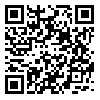Volume 11, Issue 41 (9-2004)
RJMS 2004, 11(41): 393-399 |
Back to browse issues page
Download citation:
BibTeX | RIS | EndNote | Medlars | ProCite | Reference Manager | RefWorks
Send citation to:



BibTeX | RIS | EndNote | Medlars | ProCite | Reference Manager | RefWorks
Send citation to:
Hajian Motlaq N, Farshi S, Abdollahi E, Arvantaj A, Kordestani A, Ahmadi Yazdi S, et al . Savodjbolagh High School Students’ Knowledge and Attitude to HIV & AIDS in Spring 2002. RJMS 2004; 11 (41) :393-399
URL: http://rjms.iums.ac.ir/article-1-27-en.html
URL: http://rjms.iums.ac.ir/article-1-27-en.html
N Hajian Motlaq 
 , S Farshi
, S Farshi 
 , E Abdollahi *
, E Abdollahi * 
 , A Arvantaj
, A Arvantaj 
 , A Kordestani
, A Kordestani 
 , S Ahmadi Yazdi
, S Ahmadi Yazdi 
 , A Khorami Banaraki
, A Khorami Banaraki 
 , A Asadi
, A Asadi 
 , M Kianpisheh
, M Kianpisheh 
 , R Bayat
, R Bayat 
 , M.R Narmani
, M.R Narmani 


 , S Farshi
, S Farshi 
 , E Abdollahi *
, E Abdollahi * 
 , A Arvantaj
, A Arvantaj 
 , A Kordestani
, A Kordestani 
 , S Ahmadi Yazdi
, S Ahmadi Yazdi 
 , A Khorami Banaraki
, A Khorami Banaraki 
 , A Asadi
, A Asadi 
 , M Kianpisheh
, M Kianpisheh 
 , R Bayat
, R Bayat 
 , M.R Narmani
, M.R Narmani 

Abstract: (10586 Views)
The objective of the present study was to determine Savodjbolagh high school students’ knowledge and attitude to HIV and AIDS. In this descriptive cross-sectional study 1224 student were selected from 58 urban and rural high schools in Savojbolagh with the random numbers table. A questionnaire was administered by the researchers which contained some questions about HIV transmission ways, attitudes to HIV, questions on preventive methods and information sources of HIV. The analysis of the data was achieved by SPSS software. 29.7% of students believed that AIDS is a great threat to health while 19.5% of them believed environmental pollution is the main cause of it and 11.9% of them believed addiction is an important threat. 84.3% of the students were informed via television and only 15.5% of them got the information from their books. In their opinion, the majority of patients were infected by HIV through sexual misbehaviours(34.9%) and IV drugs abusing(33.1%). They believed that one of the main ways of transmission was using a common shaving blade(43%). About 58% of students believed that the infected patients had to be isolated. 39% and 81% of the students believed that condom and vaccination are effective ways for preventing AIDS, respectively. 64% of students preferred to be informed by the medical experts. 91% of students, agreed about, the compulsory HIV screening before marriage. This study revealed that television has an important role in improving students’ knowledge towards AIDS while their courses do not have enough information to aware them. Most of the students preferred to get information from the medical experts. The students have limited knowledge about AIDS transmission ways, its preventive and contraception methods. It seems that training of reproductive health is definitely required.
Type of Study: Research |
Subject:
Community Medicine



